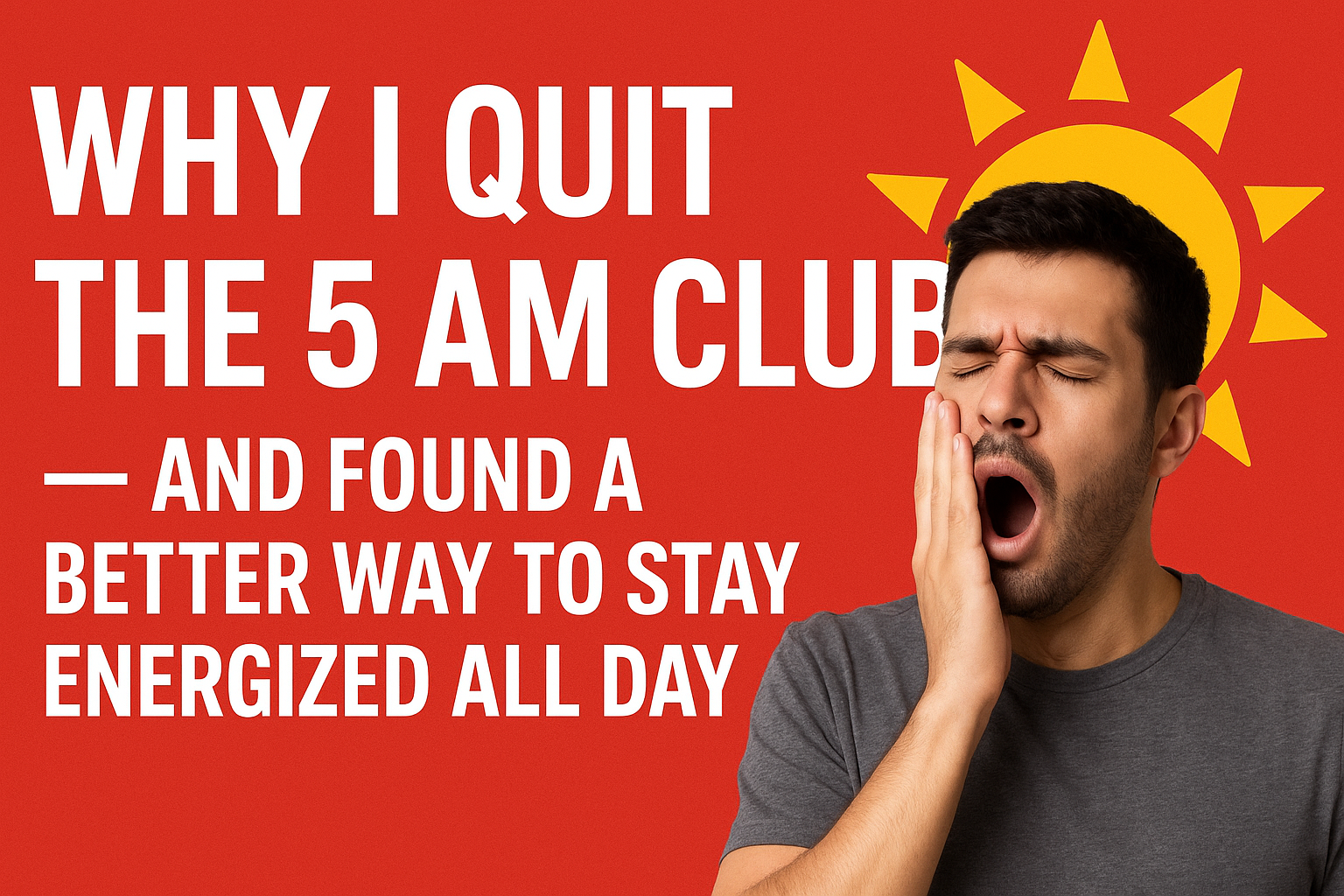Why I Quit the 5 AM Club — And Found a Better Way to Stay Energized All Day
For years, I bought into the hype: wake up at 5 AM, meditate, exercise, journal, and somehow watch your life transform—as if sunrise itself had magical properties. I set my alarm with saintly intentions, convinced I’d finally unlock the secret sauce of billionaires.
The first week felt empowering. There was a strange thrill in being awake before most of the city. The streets were quiet, the air felt sharper, and for a moment I thought, This is what discipline tastes like. I meditated in stillness, filled pages with affirmations, and even managed a pre-dawn workout without grumbling too much.
By week two, the romance faded. My body protested like an old computer booting up in safe mode. Social dinners became rare because I was chasing an early bedtime like it was a mythical creature. The coffee cup became a permanent fixture in my hand—not for the taste, but for survival.
By day 30, I was drinking more coffee than water, yawning in morning meetings, and resenting my alarm clock like an unpaid intern who keeps showing up with more work. The supposed clarity and energy never arrived; instead, I felt like I was running a sleep deficit marathon with no finish line.
Here’s the truth about the 5 AM Club no one talks about—and the simple change that gave me more energy than any early alarm ever did.
The 5 AM Club Promise
The idea is seductive: wake before the world, claim those precious, silent hours, and ride the wave of razor-sharp early-morning focus. Productivity gurus swear by it, often with the enthusiasm of a late-night infomercial. You’ll hear how athletes train before dawn, CEOs write strategy plans while the city sleeps, and authors crank out novels before breakfast—as if there’s a universal magic switch that flips at 5:00 sharp.
And for some people, it truly is magic. If your natural rhythm leans toward early mornings, the stillness can feel almost sacred—no pings, no traffic, just you and your thoughts stretching into the day ahead. The air is crisp, your mind uncluttered, and you can almost feel your head start above the rest of the world.
But here’s the part the glossy productivity books skip over: that “head start” comes with hidden costs. Costs that don’t show up on Instagram reels. Costs you don’t notice right away—until your social life shrinks, your afternoons become a fog, and your body starts quietly rebelling against a schedule it never agreed to. For night owls and even moderate risers like me, the early-bird glow can quickly turn into early-bird burnout.
My 30-Day Experiment
I started strong. Week one, I was practically high on self-discipline — riding that smug, self-improvement wave like I’d finally cracked the code to life. I drank warm lemon water as if it were some ancient elixir of champions. I even stretched in my living room, basking in the early-morning light like someone in a fitness ad who has never known the concept of snooze buttons.
Then reality crept in.
By week two, my evenings had turned into a frantic race to be in bed by 9 PM. Social dinners? Forgotten. Spontaneous plans? Absolutely not — I was chasing my bedtime like it was a rare celestial event. My friends started joking that I was “living in another time zone.”
By 5 PM, my brain wasn’t just tired — it felt like mashed potatoes left out on the counter too long. My coffee consumption doubled, then tripled, yet my energy still nosedived by mid-morning. That clean, focused buzz I’d been promised? Nowhere in sight.
The real kicker?
My actual productivity didn’t improve. I wasn’t producing better work or having breakthrough ideas — I was just awake longer, dragging myself through the day in a haze and calling it “discipline.”
The Science of Sleep & Energy
Here’s what I discovered (and later confirmed with research):
Chronotypes matter — some people are biologically wired to peak later in the day. Forcing yourself to rise early can mess with your natural rhythms.
Sleep debt is real — waking earlier without sleeping earlier creates a deficit that caffeine can’t fix.
Quality beats quantity — a focused, energized 6 hours of work trumps a sluggish 10.
A 2023 study in Nature and Science of Sleep found that aligning your schedule with your chronotype improved both focus and mood by over 20%. In other words: when you work with your body, you get more done.
What I Do Instead
Instead of joining the 5 AM Club, I built a routine that works for my energy patterns:
1. Consistent Wake Time
I wake up at 7 AM every day — weekends included. My body loves the rhythm, and I don’t need three alarms to get up.
2. Light Before Screens
I step outside for 5–10 minutes of natural light before touching my phone. This resets my circadian clock and wakes me up faster than coffee.
3. “Energy Blocks”
I tackle my most mentally demanding work between 9 AM and noon, when my brain is naturally sharpest. Admin tasks wait until the afternoon.
4. Short Movement Bursts
Two or three 5-minute stretch or walk breaks keep me from hitting that mid-afternoon wall.
How to Find Your Ideal Routine
If you’ve tried the 5 AM Club and ended up feeling like a zombie with a to-do list, here’s a simple experiment to help you find your real productivity sweet spot—no predawn suffering required.
Step 1: Track your natural energy highs and lows for a week.
Grab a notebook or use a free app to jot down when you feel alert, creative, sluggish, or unfocused. You might be surprised—your peak creativity could be at 10 AM, or maybe it’s 8 PM. The point is to see your patterns, not copy someone else’s.
Step 2: Set your wake time so you still get 7–8 hours of sleep.
If you need to wake at 7 AM, count backward to make sure your head hits the pillow on time. Skipping sleep is like stealing from tomorrow’s productivity to pay for today’s—it never ends well.
Step 3: Reserve your energy peak for your hardest work — no email first thing.
When you’re at your sharpest, avoid shallow tasks like scrolling, checking messages, or tweaking spreadsheets. Instead, use that time for deep-focus work: writing, designing, coding, strategic thinking. You’ll get more done in 90 focused minutes than in three distracted hours.
Step 4: Protect your bedtime like an early-morning meeting.
This is where most people fail. Treat your bedtime as non-negotiable. That means dimming lights, cutting caffeine late in the day, and—yes—logging off Netflix before “just one more episode” turns into midnight.
Try this for two weeks and watch what happens. You’ll likely discover that you don’t need to wake at dawn to have a productive, meaningful day—you just need to work with your energy, not against it.
My Final Findings
The 5 AM Club isn’t a scam — it’s just not one-size-fits-all. The key isn’t when you wake up, but whether your schedule supports deep work, enough rest, and time for the people and things that matter.
If you’re tired of chasing an alarm clock that makes you hate mornings, try building a routine around your energy — not someone else’s Instagram reel.
If you want more real-life habit experiments like this, join the Luminary Voice Newsletter — where I share strategies that actually work in the real world.







